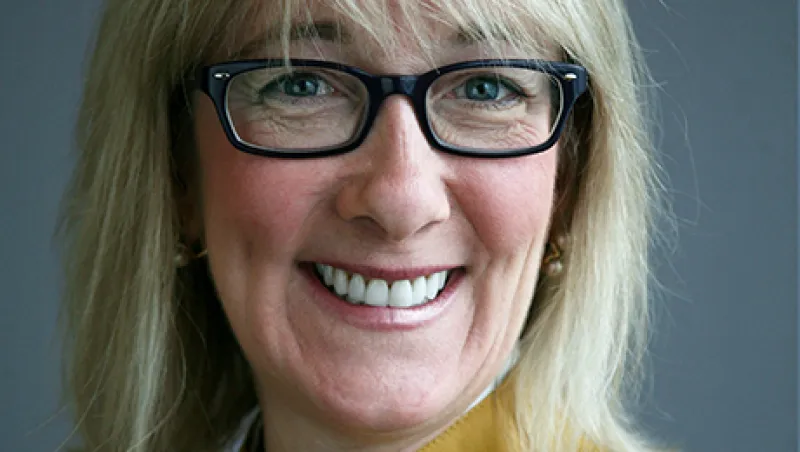Leveraged finance has a bad name among critics of the financial profession, but Marisa Drew has used her mastery of the craft to help build several business empires and make a trailblazing career as a woman in the testosterone-fueled capital markets. Last year was a big one for Drew, 49. She and her team at Credit Suisse Group’s London office co-advised cable operator Liberty Global on its $25.5 billion acquisition of U.K.-based Virgin Media, and she was appointed co-head of investment banking for Europe, the Middle East and Africa. Credit Suisse’s revenue from debt capital markets in the region jumped 33 percent in 2013, to $300 million, according to Dealogic, keeping the bank in eighth place. Overall EMEA investment banking revenue advanced by 5 percent, to $708 million.
Drew, who holds an MBA from the Wharton School of the University of Pennsylvania, did her apprenticeship in leverage in the late 1980s with Eddie and Julius Trump, early private equity investors funded by junk-bond king Michael Milken. She then tried starting her own business, a chain of after-school learning centers, but missed the higher stakes and hectic pace of the markets. “I realized I wanted to work with entrepreneurs, just not be one myself,” Drew says.
Raising money for ambitious telecom and media companies that were growing at a furious pace through the 1990s seemed an ideal compromise. Drew landed a job as an associate in leveraged finance in Merrill Lynch & Co.’s New York office. Merrill sent her to London in 1999 to start a leveraged-finance group for Europe. “When I first moved here, most corporate finance directors were debt-averse and leveraged finance was considered to be an aggressive U.S. method of financing growth,” recalls Drew, who followed her military father to several postings in the U.S. and Europe while growing up. “But nearly every major industry you can think of in the U.S. was built on the back of leverage: oil and gas exploration, supermarkets, mobile telephony, cable television. Where you go wrong is when you justify leverage with business plans that are not robust.”
The credit-heated telecom and dot-com bubble began to burst within a year of Drew’s arrival, and “things went quiet for a while,” she says. But the banker found a kindred spirit in John Malone, the Colorado-based media billionaire who set about picking up the pieces of the bust in Europe through Liberty Global — and didn’t mind borrowing to do it. In 2003 she also found a new home at Credit Suisse, whose First Boston investment banking arm had helped expand the leverage envelope in the U.S., as co-head of European leveraged finance origination.
Drew has raised more than $50 billion for London-based Liberty Global over the past decade, spurring half a dozen acquisitions of European cable and Internet providers. Her prolific fundraising has helped convert a whole continent to more-daring options for corporate finance, says Charles Bracken, co–chief financial officer at Liberty Global: “There was no European high-yield market when Marisa started; now it’s almost as sophisticated as the U.S.”
Other key Drew clients have included Wind Telecom, a cellular carrier with operations from Italy to Pakistan pieced together by Egyptian tycoon Naguib Sawiris and now owned by Russia’s Vimpel-Com; and Britain’s Millennium Dome. The vast Dome stood vacant on a bend in the River Thames in southeast London for seven years after the celebrations of 2000. Then Drew teamed up with Los Angeles–based concert and sports promoter Anschutz Entertainment Group, which owns the Staples Center in its home city. She raised £270 million ($494 million) in 2006, most of it from U.S. investors, enough to refurbish the Dome as a successful entertainment venue now known as the O2 arena. “Everyone in the U.K. insisted there was no way people would go all the way to Greenwich to see a concert at the Millennium Dome, but American investors understood the opportunity and the track record of success of AEG,” she says.
In her spare time Drew crusades for a future with more female colleagues through several groups, including Credit Suisse’s own Women in Banking Committee, which she chairs. She sees a trend toward more-holistic masters and mistresses of the universe since the shock of 2008, a change that should eventually make the profession more inviting to women, she predicts. More quantifiably, Drew sees European companies in what she calls a secular shift from bank financing to debt markets, including high-yield debt. Issuance of European speculative-grade debt, rated BB or lower by Standard & Poor’s, jumped by 54 percent in 2013, to $121.9 billion, according to Dealogic, compared with $259.5 billion for the U.S. This rainmaker has every opportunity to keep banking up a storm. • •






